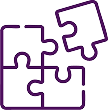Empowering Medical Teams to Maximize Clinical Impact
For clinical development leads, medical affairs & translational research teams
Your Strategic Roadblocks

Enhancing Product Competitiveness
Stand out in
crowded therapeutic areas

Strengthening Medical Positioning
Craft stronger
medical narrative

Maximizing Probability of Success & Shortening Time-to-Market
De-risk clinical
decisions from early design
Our Solutions
Our solutions support Medical and Clinical teams throughout the lifecycle of a therapy, from preclinical strategy to post-marketing optimization, by leveraging RWD earlier in the evidence generation process & advanced AI-technology
Clinical Trial Optimization
Leverage data science to de-risk and accelerate trials
- Trial designs optimization
- Pre-diagnostic algorithm
- Trial rescue
- Synthetic data generation
Lifecycle Strategy Optimization
Make informed decisions with a comprehensive view of patient and disease trajectories
- Indication identification and prioritization
- Disease progression modeling
- Treatment & switching patterns modeling
- Bridging efficacy to real-world effectiveness
Value Maximization
Uncover hidden clinical and commercial value
- Post hoc analyses of RCTs and real-world data mining
- Drug repurposing support for in/out licensing & divestment strategies
- Evidence Generation plans optimization & enhancement
Positioning & Simulation Management
Support strategic and cross-functional alignment with simulated insights
- Competitive scenario modeling
- Positioning scenario simulation
Your Benefits


Accelerated and optimized clinical development
Through smarter trial designs, earlier patient identification, and biomarker-driven stratification

Improved indication and lifecycle strategy decisions
Thanks to advanced modeling of disease progression, treatment patterns, and patient heterogeneity

Stronger medical differentiation and positioning
Through simulations that reveal competitive advantages and enable strategic scenario testing

More impactful evidence generation
Leveraging post hoc analyses, pragmatic simulations, and bridging real-world effectiveness to RCT efficacy
See Our Solutions in Action
Infectious Diseases
Identifying Drivers of Self-Diagnosis to Enable Over-The-Counter (OTC) Switch

Infectious Diseases
Identifying Drivers of Self-Diagnosis to Enable OTC Switch
Discover how AI helped define differentiating symptoms to support OTC switch approval
Challenge
- Indistinct Symptom Profiles: Easy self-diagnosis is critical for OTC switch, but symptoms overlap with other infectious diseases
- Need for Diagnostic Precision: Facilitate accurate self-diagnosis and define early disease onset
Our Solution
- Machine Learning on Real-World Data: Classification models with interpretability layers to identify key self-diagnosable symptoms
Results and Impact
- Identified 9 differentiating symptoms enabling self-diagnosis
- Provided actionable insights provided supporting regulatory application for OTC switch

Rare Diseases
Predicting the Progression of a Rare Disease
Explore how we stratified patients with a rare disease to inform the optimal initiation of treatment
Challenge
- Variable Disease Phenotypes: This rare disease manifests in diverse phenotypes, leading to early or late progression
- Need for Early Intervention: Identification of patients at risk of rapid decline to guide timely treatment initiation
Our Solution
Applied Data-Driven Disease Modeling using Real-World Data to stratify patients by progression speed and detect early markers of accelerated disease
Results and Impact
- Enabled personalized treatment initiation strategies
- Identified turning points for disease acceleration
- Supported RCT design optimization through disease trajectory simulation

Cardiovascular Diseases
Optimizing Care Pathways for Heart Failure Patients
See how we optimized HF patient stratification to inform care pathways using real-world evidence
Challenge
- Variable Disease Progression: Heart failure progression varies significantly, complicating therapeutic pathways
- Need for Tailored Care: Precisely segment patients to align care strategies with clinical and economic goals
Our Solution
- Data-Driven Clustering: Applied clustering algorithms on US claims data
- Phenotype Stratification: Identified clinically relevant HF phenotypes based on comorbidities and progression patterns
Results and Impact
- Discovered 6 unique HF patient phenotypes with distinct comorbidities and hospitalization risks
- Provided actionable segmentation for clinical decision-making and targeted interventions

Whether you’re aiming to improve trial outcomes, redefine your medical narrative, or extract more value from existing data, we’re here to help

Whether you’re aiming to improve trial outcomes, redefine your medical narrative, or extract more value from existing data, we’re here to help

